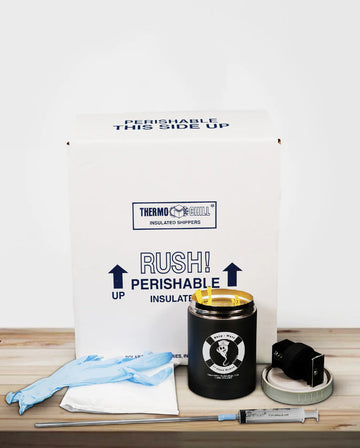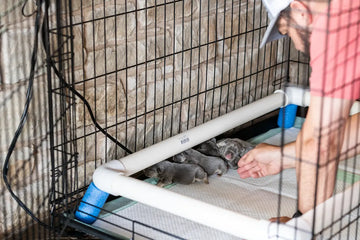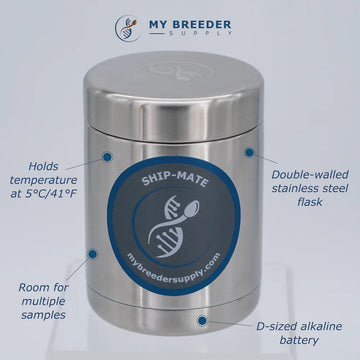Giardia vs Parvo: Understanding the Differences and Similarities
by Phenyx Media on Sep 20, 2023

In the realm of pet health, two illnesses often stir up concern among pet owners - Giardia and Parvo. These diseases, while distinct in their origins and symptoms, both pose serious risks to our furry friends. This article aims to explore the differences and similarities between Giardia and Parvo, aiming to provide valuable information for pet owners.
Understanding Giardia
Giardia is a small, microscopic parasite that infects the intestines of many animals, including dogs, cats, and even humans. This culprit is responsible for a condition known as giardiasis, an intestinal infection marked by diarrhea, stomach cramps, and nausea.
Causes of Giardia
The Giardia parasite thrives in environments with poor sanitation and can survive for weeks to months outside a host in the right conditions. Pets usually contract Giardia by ingesting the infective cysts, which may be present in contaminated water, food, or surfaces. Even sniffing or licking an object or animal that has come in contact with the parasite can lead to infection.
Symptoms and Treatment of Giardia
Affected pets often show signs of illness within one to two weeks after exposure. Symptoms may include foul-smelling diarrhea that may be greasy or frothy, vomiting, weight loss, decreased activity, and a swollen abdomen. However, some pets may carry the parasite without showing symptoms, further facilitating its spread.
Treatment of giardiasis involves a course of antiparasitic medications to eliminate the parasite. Hydration is crucial to help the pet recover from potential dehydration caused by diarrhea. Cleaning the pet's environment is also essential to prevent reinfection.
Getting to Know Parvo
Parvovirus, commonly known as Parvo, is a highly contagious viral illness seen predominantly in puppies and young dogs. This virus is notorious for its severity, causing symptoms that range from mild discomfort to life-threatening illness.
Causes of Parvo
Parvo spreads either by direct contact with an infected dog or through fecal-oral transmission. It can survive on surfaces like clothing, food bowls, shoes, or floors for months, making it extremely hard to eradicate.
Symptoms and Treatment of Parvo
Parvo attacks the dog's gastrointestinal tract, leading to symptoms such as severe vomiting, bloody diarrhea, fever, lethargy, and loss of appetite. As the disease progresses, it can also depress the dog's immune system, making them susceptible to secondary infections.
Treatment for Parvo primarily involves supportive care, as there is no specific cure for the virus. This includes intravenous fluid therapy to counter dehydration, medications to control vomiting and diarrhea, and antibiotics to prevent secondary bacterial infections. Parvo can be fatal, especially in puppies, so prompt veterinary attention is crucial.
Contrasting Giardia and Parvo

Although both Giardia and Parvo cause gastrointestinal issues in pets, they have fundamental differences. Giardia, being a parasite, requires a host to live and multiply. In contrast, Parvo, a virus, invades cells and alters their genetic coding to reproduce. Additionally, Parvo is generally more severe and life-threatening than Giardia, especially in unvaccinated puppies.
Comparing Giardia and Parvo
When comparing these two conditions, it's clear that both can cause significant distress to our pets. They share common symptoms, such as diarrhea, vomiting, and lethargy. Additionally, both diseases can be contracted from contaminated environments, underlining the importance of good hygiene and sanitation.
Diagnosis of Giardia and Parvo
Diagnosing Giardia or Parvo starts with a veterinary consultation, where the vet will perform a physical examination and consider the pet's history. For Giardia, stool samples are usually analyzed for the presence of cysts. For Parvo, a fecal test known as the ELISA test is commonly used to detect viral antigens.
Prevention Measures for Giardia and Parvo
Preventing Giardia
To prevent Giardia, pet owners should ensure their pets have access to clean drinking water and avoid areas with potential fecal contamination. Regular deworming can also help to control the spread of this parasite.
Preventing Parvo
The best way to prevent Parvo is through vaccination. Puppies should receive their first Parvo vaccine between 6 to 8 weeks of age, with boosters every three to four weeks until they are about 16 weeks old. Additionally, avoiding unvaccinated dogs and unsanitary environments can help to reduce the risk of Parvo.
The Impact of Giardia and Parvo on Pets and Their Owners
The impact of these diseases extends beyond the physical suffering of our pets. Dealing with Giardia or Parvo can be emotionally and financially draining for pet owners. However, with prompt detection, appropriate treatment, and preventative measures, these conditions can be effectively managed.
Conclusion
Understanding the differences and similarities between Giardia and Parvo can better equip pet owners to protect their furry friends. While these diseases can be alarming, awareness and proactive measures are the first steps toward prevention and control.
FAQs
Can humans get Giardia or Parvo from their pets?
Humans can contract Giardia, but it's rare for humans to get Parvo as it primarily affects dogs.
How long does it take for a pet to recover from Giardia or Parvo?
With proper treatment, pets can recover from Giardia in 2 to 4 weeks. Parvo recovery can take longer, often around a month.
Are there vaccines available for both Giardia and Parvo?
While there's a vaccine for Parvo, currently, there's no available vaccine for Giardia in dogs and cats.
Can my pet get Giardia or Parvo more than once?
Yes, reinfection is possible with both diseases. Regular preventative measures should be undertaken.
Can my pet still spread Giardia or Parvo after they have recovered?
Yes, even after recovery, pets can still shed Giardia cysts or Parvo virus in their feces for weeks, which can infect other animals.




